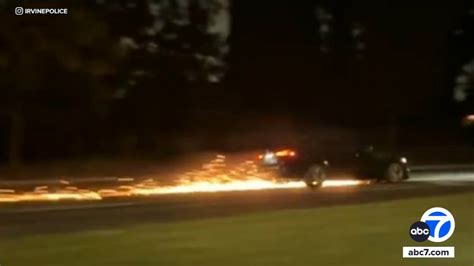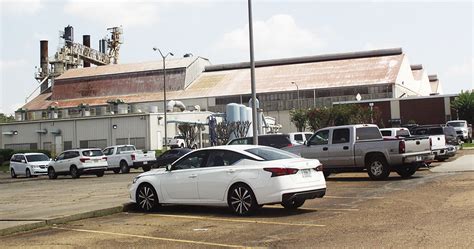
A high-speed police chase in Oklahoma City concluded with a suspect in custody after a chaotic pursuit involving thrown objects and a collision on Tuesday.
Oklahoma City – A man is now in custody following a wild police chase through Oklahoma City on Tuesday, which involved the suspect throwing wooden boards from his vehicle and ultimately crashing into another car. The pursuit began after officers attempted to stop the suspect, identified as 47-year-old Ricky Todd Ward, in connection to a separate incident.
According to the Oklahoma City Police Department (OCPD), the incident unfolded when officers tried to initiate a traffic stop on Ward. Instead of complying, Ward allegedly fled, initiating a chase that traversed several city streets. During the pursuit, Ward was seen throwing wooden boards from his vehicle, creating a hazard for other drivers and law enforcement.
“During the pursuit, the suspect was throwing items out of the vehicle, endangering other drivers,” said Sergeant Dillon Quirk of the OCPD. “These items were later identified as wooden boards.”
The chase culminated when Ward’s vehicle collided with another car at the intersection of NW 10th Street and Rockwell Avenue. The impact caused significant damage to both vehicles, and Ward was immediately taken into custody following the crash. The driver of the other vehicle sustained minor injuries and was treated at the scene by paramedics.
Ward now faces multiple charges, including eluding police, reckless driving, and assault with a deadly weapon due to the act of throwing the wooden boards. He is currently being held at the Oklahoma County Detention Center.
The Chase and the Thrown Objects
The incident began earlier Tuesday when police attempted to stop Ward for questioning related to an unspecified investigation. Upon refusing to stop, Ward sped away, leading officers on a chase that lasted for approximately 20 minutes.
Throughout the pursuit, Ward’s actions grew increasingly erratic and dangerous. He was observed swerving between lanes, running red lights, and exceeding speed limits, all while tossing wooden boards from his moving vehicle. These boards posed a significant threat to other motorists, as they could have easily caused accidents or injuries.
“The suspect’s behavior was incredibly reckless,” stated Officer Megan Morgan, a spokesperson for the OCPD. “Throwing objects from a moving vehicle, especially wooden boards, can have catastrophic consequences. We are fortunate that no one was seriously injured as a result of his actions.”
Eyewitness accounts detail the tense atmosphere during the chase. “I saw him throwing stuff out of the car, and I was scared it would hit my windshield,” said local resident Sarah Jenkins, who witnessed part of the pursuit. “It was like something out of a movie.”
The Collision and Aftermath
The chase reached its climax at the intersection of NW 10th Street and Rockwell Avenue, a busy area known for its heavy traffic. As Ward approached the intersection, he reportedly failed to stop at a red light and collided with another vehicle that was legally proceeding through the intersection.
The impact of the collision was substantial, causing significant damage to both vehicles. Emergency responders were immediately dispatched to the scene, including police officers, firefighters, and paramedics. The driver of the other vehicle, identified as 35-year-old Michael Thompson, sustained minor injuries and was treated at the scene.
“I’m just glad it wasn’t worse,” Thompson said in a statement released through his lawyer. “It all happened so fast. One minute I was driving, and the next, I was being hit by another car. I’m thankful for the quick response of the emergency services.”
Following the crash, Ward was apprehended by police officers and taken into custody without further incident. He was subsequently transported to the Oklahoma County Detention Center, where he is currently being held pending formal charges.
Legal Implications and Charges
Ricky Todd Ward is facing a series of serious charges in connection with the police chase and the events that transpired during the pursuit. These charges include:
- Eluding Police: This charge stems from Ward’s refusal to stop his vehicle when ordered to do so by law enforcement officers. Eluding police is a felony offense in Oklahoma and can carry significant penalties, including imprisonment and fines.
- Reckless Driving: Ward’s erratic and dangerous driving behavior during the chase, including speeding, swerving, and running red lights, constitutes reckless driving. This charge is typically a misdemeanor but can be elevated to a felony if it results in serious injury or death.
- Assault with a Deadly Weapon: The most serious charge Ward is facing is assault with a deadly weapon. This charge is based on his actions of throwing wooden boards from his vehicle, which police say endangered other drivers and could have caused serious harm. A vehicle or thrown object can be considered a deadly weapon if used in a manner likely to cause death or great bodily harm. This is a felony offense that carries a substantial prison sentence upon conviction.
In addition to these charges, Ward may also face other traffic-related offenses, such as speeding, running red lights, and failure to maintain control of his vehicle. The Oklahoma County District Attorney’s Office will ultimately determine the specific charges that will be filed against Ward.
Background on Ricky Todd Ward
At the time of this writing, details about Ricky Todd Ward’s background remain limited. Public records indicate that he has a prior history of traffic violations and minor criminal offenses. However, there is no indication that he has previously been involved in a high-speed police chase or charged with a violent crime.
Investigators are currently working to determine Ward’s motives for fleeing from the police and throwing the wooden boards from his vehicle. It is possible that he was under the influence of drugs or alcohol at the time of the incident, although this has not yet been confirmed.
Police Pursuit Policies and Procedures
The incident involving Ricky Todd Ward raises questions about police pursuit policies and procedures in Oklahoma City. Police pursuits are inherently dangerous and can pose a significant risk to both law enforcement officers and the public. As a result, police departments across the country have developed strict guidelines governing when and how officers can engage in vehicle pursuits.
The OCPD’s pursuit policy emphasizes the importance of balancing the need to apprehend suspects with the need to protect public safety. The policy states that officers should only initiate a pursuit when there is reasonable suspicion that the suspect has committed a violent felony or poses an immediate threat to the safety of others.
The policy also requires officers to continuously assess the risks associated with the pursuit and to terminate the pursuit if the risks outweigh the potential benefits of apprehending the suspect. Factors that officers must consider include the speed of the pursuit, the traffic conditions, the weather conditions, and the presence of pedestrians or other vehicles.
In the aftermath of the incident involving Ricky Todd Ward, the OCPD will likely conduct an internal review to determine whether the pursuit was conducted in accordance with department policy. This review will examine the officers’ decision-making process and will identify any areas where improvements can be made.
Community Reaction
The high-speed police chase and subsequent collision have sparked a range of reactions from the Oklahoma City community. Some residents have expressed concern about the safety of the streets and have called for increased police presence in the area. Others have questioned the police department’s pursuit policies and have argued that the pursuit should have been terminated sooner.
“I was driving down the street and had to pull over because this maniac was being chased by the cops. It was terrifying,” said Maria Hernandez, a local business owner. “The police need to be more careful. What if someone had been seriously hurt or killed?”
Local community leaders have called for a dialogue between the police department and the community to address concerns about public safety and police accountability. They have also emphasized the importance of working together to prevent future incidents like this from occurring.
Expert Commentary
Several law enforcement experts have weighed in on the incident, offering their insights into the challenges of police pursuits and the importance of sound decision-making.
“Police pursuits are one of the most dangerous things that officers do,” said retired police chief Robert Davis, a consultant on law enforcement practices. “They have to make split-second decisions in high-pressure situations, and the consequences of those decisions can be life-altering.”
Davis emphasized the importance of training and experience in ensuring that officers are prepared to handle police pursuits safely and effectively. He also stressed the need for clear and consistent pursuit policies that provide officers with guidance on when and how to engage in pursuits.
“The primary goal of any police pursuit should be to apprehend the suspect while minimizing the risk to the public,” Davis said. “That requires a careful balancing act, and it’s not always easy to achieve.”
The Broader Context of Police Pursuits
The incident in Oklahoma City highlights the ongoing debate about the role and regulation of police pursuits in the United States. Police pursuits are a common law enforcement tactic, but they also pose a significant risk to public safety. According to data from the National Highway Traffic Safety Administration (NHTSA), hundreds of people are killed and thousands more are injured each year in police pursuit-related crashes.
In recent years, there has been growing pressure on police departments to reform their pursuit policies in order to reduce the risk of injury and death. Some police departments have adopted stricter guidelines that limit when officers can engage in pursuits, while others have invested in technology and training to improve the safety of pursuits.
The debate over police pursuits is likely to continue in the years to come as law enforcement agencies grapple with the challenge of balancing the need to apprehend suspects with the need to protect public safety. The incident involving Ricky Todd Ward serves as a reminder of the potential dangers of police pursuits and the importance of careful planning, sound decision-making, and ongoing training.
Updated Information:
As of late Wednesday, Ricky Todd Ward remains in custody at the Oklahoma County Detention Center. His bail has been set at $75,000. He is scheduled to appear in court next week for his arraignment. The investigation is ongoing, and authorities are still gathering evidence and interviewing witnesses. The OCPD is also reviewing its pursuit policies to ensure they are up-to-date and effective.
FAQ
1. What triggered the police chase involving Ricky Todd Ward in Oklahoma City?
The police chase began when officers attempted to stop Ricky Todd Ward in connection to a separate, unspecified incident. Instead of complying, Ward allegedly fled, leading to the pursuit.
2. What specific actions did Ricky Todd Ward allegedly take during the chase that endangered others?
During the chase, Ward was observed throwing wooden boards from his vehicle. This posed a significant threat to other motorists, as the boards could have caused accidents or injuries. He was also driving recklessly, swerving between lanes, running red lights, and exceeding speed limits.
3. What charges does Ricky Todd Ward currently face as a result of the incident?
Ricky Todd Ward faces multiple charges, including eluding police, reckless driving, and assault with a deadly weapon due to the act of throwing the wooden boards. He may also face other traffic-related offenses.
4. What were the injuries reported, and who sustained them during the pursuit and collision?
The driver of the other vehicle involved in the collision, identified as 35-year-old Michael Thompson, sustained minor injuries and was treated at the scene by paramedics. No other serious injuries were reported.
5. What is the OCPD’s policy regarding police pursuits, and what steps are being taken following this incident?
The OCPD’s pursuit policy emphasizes balancing the need to apprehend suspects with the need to protect public safety, allowing pursuits only when there is reasonable suspicion of a violent felony or an immediate threat to safety. Following the incident, the OCPD will likely conduct an internal review to ensure the pursuit was conducted in accordance with department policy and to identify any areas for improvement.
Detailed Analysis of the Charges Against Ward
The three primary charges against Ricky Todd Ward—eluding police, reckless driving, and assault with a deadly weapon—carry varying levels of severity and are based on distinct aspects of his actions during the chase. A closer examination of each charge provides a clearer understanding of the potential legal consequences Ward faces.
Eluding Police: A Felony Offense
In Oklahoma, eluding police is a serious offense, often classified as a felony depending on the circumstances. Oklahoma Statute Title 21 § 540A defines eluding a police officer as intentionally fleeing or attempting to elude a pursuing police vehicle after having received a visual or audible signal from a police officer. The severity of the charge and the associated penalties depend on factors such as the level of recklessness involved and whether the eluding resulted in injury or property damage.
Given the reported details of Ward’s actions, including his high-speed flight and disregard for traffic laws, it is likely he will face felony charges for eluding. The penalties for felony eluding can include imprisonment for a term of one to five years, a fine ranging from $1,000 to $5,000, or both. The rationale behind such stringent penalties is to deter individuals from endangering themselves and others by attempting to evade law enforcement.
Reckless Driving: Disregard for Safety
Reckless driving is typically charged as a misdemeanor offense, although it can be elevated to a felony if it results in bodily injury to another person. Oklahoma law defines reckless driving as operating a motor vehicle with a willful or wanton disregard for the safety of persons or property. This encompasses a wide range of dangerous behaviors, including speeding, weaving through traffic, and disobeying traffic signals.
Ward’s actions during the police chase clearly meet the definition of reckless driving. Witnesses reported that he was speeding, swerving between lanes, and running red lights, all of which demonstrate a disregard for the safety of others on the road. While the penalties for misdemeanor reckless driving are less severe than those for felony eluding, they can still include fines, imprisonment, and suspension of driving privileges.
Assault with a Deadly Weapon: The Most Serious Charge
The charge of assault with a deadly weapon is the most serious one Ward faces, and it carries the most significant potential penalties. In Oklahoma, assault with a deadly weapon is defined as intentionally and unlawfully attempting to cause bodily harm to another person with a deadly weapon. The key element of this charge is the use of a deadly weapon, which is defined as any instrument or substance that is likely to cause death or great bodily harm.
In Ward’s case, the wooden boards he allegedly threw from his vehicle are being considered deadly weapons. Prosecutors will argue that these boards were used in a manner likely to cause serious injury or death to other drivers. If convicted of assault with a deadly weapon, Ward could face a lengthy prison sentence, potentially ranging from one to ten years, depending on the specific circumstances of the offense and his prior criminal history.
The Importance of Intent
A critical aspect of the assault with a deadly weapon charge is the element of intent. Prosecutors must prove beyond a reasonable doubt that Ward intentionally threw the wooden boards with the intent to cause harm to others. This can be a challenging task, as it requires demonstrating Ward’s state of mind at the time of the incident.
Prosecutors may rely on circumstantial evidence to establish intent, such as the manner in which Ward threw the boards, the location of other vehicles at the time, and any statements Ward may have made. If prosecutors are unable to prove intent, the charge of assault with a deadly weapon may be reduced to a lesser offense, such as reckless endangerment.
Defense Strategies
Ward’s defense attorney will likely explore various strategies to challenge the charges against him. These strategies may include:
- Challenging Intent: As noted above, the defense may argue that Ward did not intend to cause harm to others when he threw the wooden boards. They may argue that he was simply trying to get the police to stop chasing him or that he was acting out of desperation.
- Questioning the Deadly Weapon Designation: The defense may argue that the wooden boards do not meet the legal definition of a deadly weapon. They may argue that the boards were not inherently dangerous and that Ward did not use them in a manner likely to cause death or great bodily harm.
- Asserting Mistake of Fact: The defense may argue that Ward mistakenly believed that he was not required to stop for the police or that he did not realize the wooden boards could cause harm to others.
- Challenging the Legality of the Stop: The defense may argue that the initial traffic stop was unlawful, which would call into question the entire chain of events that followed.
The Impact on Michael Thompson
While Ricky Todd Ward faces criminal charges, Michael Thompson, the driver of the vehicle that was struck during the chase, may also have legal recourse. Thompson could pursue a civil lawsuit against Ward to recover damages for his injuries, medical expenses, lost wages, and pain and suffering.
In a civil case, Thompson would have to prove that Ward was negligent in his actions and that his negligence caused Thompson’s injuries. Given the circumstances of the incident, it is likely that Thompson would be able to establish negligence. He would then have to prove the extent of his damages in order to recover compensation.
The Role of Insurance
Insurance companies will also play a significant role in the aftermath of this incident. Ward’s insurance company will be responsible for covering the damages to Thompson’s vehicle and any injuries he sustained, up to the limits of Ward’s insurance policy. If Ward is uninsured or underinsured, Thompson may have to rely on his own insurance policy to cover his losses.
The Long-Term Consequences
The high-speed police chase and subsequent collision will have long-term consequences for all those involved. Ricky Todd Ward faces the possibility of imprisonment, fines, and a criminal record, which could impact his future employment prospects and his ability to obtain housing. Michael Thompson may have to deal with lasting physical and emotional injuries as a result of the collision. The community as a whole may be left feeling less safe and secure.
The incident serves as a reminder of the importance of responsible driving and the potential consequences of reckless behavior. It also underscores the challenges that law enforcement officers face in balancing the need to apprehend suspects with the need to protect public safety.
Community Response and Calls for Action
The incident has ignited a wave of reactions from the Oklahoma City community, ranging from expressions of concern and fear to calls for stricter law enforcement and a reevaluation of police pursuit policies.
Several community organizations have scheduled town hall meetings to discuss the incident and to provide a forum for residents to voice their concerns and ask questions of law enforcement officials. These meetings are intended to promote dialogue and to foster a sense of community engagement in addressing the issues raised by the chase.
Some residents have expressed anger and frustration over the incident, particularly those who witnessed the chase firsthand or who live in the area where the collision occurred. They have called for increased police patrols and for stricter penalties for those who engage in reckless driving.
Other residents have raised questions about the OCPD’s pursuit policies and have argued that the pursuit should have been terminated sooner. They have cited the potential dangers of high-speed chases and have suggested that the risks outweighed the potential benefits of apprehending Ward.
Local elected officials have responded to these concerns by promising to review the OCPD’s pursuit policies and to explore ways to improve public safety. They have also emphasized the importance of community involvement in addressing the root causes of crime and violence.
The Need for Continued Dialogue and Reform
The incident involving Ricky Todd Ward serves as a catalyst for continued dialogue and reform in the areas of law enforcement, public safety, and community engagement. It is essential that the OCPD conduct a thorough review of its pursuit policies and procedures to identify any areas where improvements can be made. It is also important that the community have a voice in this process and that their concerns are taken seriously.
In addition to addressing police pursuit policies, it is also important to address the underlying factors that contribute to crime and violence. This includes investing in education, job training, and other social programs that can help to reduce poverty and inequality. It also includes promoting community-based solutions to crime, such as neighborhood watch programs and restorative justice initiatives.
By working together, law enforcement officials, community leaders, and residents can create a safer and more just community for all. The incident involving Ricky Todd Ward should serve as a reminder of the challenges that remain and the importance of continued effort and collaboration. The pursuit, the crash, and the subsequent legal proceedings highlight the complexities of law enforcement and the need for ongoing evaluation and improvement.









